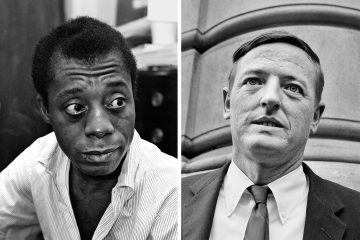John Warner in Inside Higher Ed:
 In 1965, James Baldwin debated William F. Buckley at the Cambridge Union Society, Cambridge University. The topic of the debate was, “The American Dream is at the expense of the American negro.”
In 1965, James Baldwin debated William F. Buckley at the Cambridge Union Society, Cambridge University. The topic of the debate was, “The American Dream is at the expense of the American negro.”
…Baldwin delivers his remarks slowly, somehow seeming both passionate and cool, like jazz. He is mesmerizing, as shown by the camera cutaways to the audience that sits rapt. It almost seems unfair, a distortion, to excerpt Baldwin’s remarks because as a work of rhetoric, it surpasses even the best of Martin Luther King or JFK. In the opening, he acknowledges the trap of segregation for the segregationists, that what he is discussing is a fundamental inequality born of an unjust system in which individuals are only actors:
“The white South African or Mississippi sharecropper or Alabama sheriff has at bottom a system of reality which compels them really to believe when they face the Negro that this woman, this man, this child must be insane to attack the system to which he owes his entire identity.”
He then makes deft use of the 2nd person in order to draw a circle around the experience of being black in 1960s America:
“In the case of the American Negro, from the moment you are born every stick and stone, every face, is white. Since you have not yet seen a mirror, you suppose you are, too. It comes as a great shock around the age of 5, 6, or 7 to discover that the flag to which you have pledged allegiance, along with everybody else, has not pledged allegiance to you. It comes as a great shock to see Gary Cooper killing off the Indians, and although you are rooting for Gary Cooper, that the Indians are you.”
A small ripple of laughter coursed through the Cambridge fellows at that moment. A laugh not of amusement, but recognition. Baldwin shifts to the first person, reminding the audience that the man in front of them is indeed part of this “you”:
“From a very literal point of view, the harbors and the ports and the railroads of the country–the economy, especially in the South–could not conceivably be what they are if it had not been (and this is still so) for cheap labor. I am speaking very seriously, and this is not an overstatement: I picked cotton, I carried it to the market, I built the railroads under someone else’s whip for nothing. For nothing.”
The Southern oligarchy which has still today so very much power in Washington, and therefore some power in the world, was created by my labor and my sweat and the violation of my women and the murder of my children. This in the land of the free, the home of the brave.”
Baldwin hammers the “I” in his delivery in the first part. The final lines of this passage are delivered in some combination of sorrow and disbelief. Baldwin then returns to his theme that black America is not the only group being destroyed by this system:
“Sheriff Clark in Selma, Ala., cannot be dismissed as a total monster; I am sure he loves his wife and children and likes to get drunk. One has to assume that he is a man like me. But he does not know what drives him to use the club, to menace with the gun and to use the cattle prod. Something awful must have happened to a human being to be able to put a cattle prod against a woman’s breasts. What happens to the woman is ghastly. What happens to the man who does it is in some ways much, much worse. Their moral lives have been destroyed by the plague called color.”
Baldwin finishes with this:
“It is a terrible thing for an entire people to surrender to the notion that one-ninth of its population is beneath them. Until the moment comes when we, the Americans, are able to accept the fact that my ancestors are both black and white, that on that continent we are trying to forge a new identity, that we need each other, that I am not a ward of America, I am not an object of missionary charity, I am one of the people who built the country–until this moment comes there is scarcely any hope for the American dream. If the people are denied participation in it, by their very presence they will wreck it. And if that happens it is a very grave moment for the West.”
Baldwin received a standing ovation from the very white, very British audience. The announcer says in the video that he’s never seen such a reaction at these events before.
More here. (Note: Throughout February, at least one post will honor The Black History Month. This year’s theme is “African Americans and the Vote.” Readers are encouraged to send in their suggestions)
